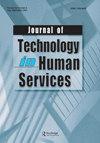Design and Implementation Considerations for Virtual Reality in Human Services
IF 1.5
Q2 SOCIAL WORK
引用次数: 0
Abstract
The special issue of the Journal of Technology and Human Services. The special issue titled Design and Implementation Considerations for Virtual Reality (VR) in Human Services aims to provide crucial considerations, strategies, findings, and lessons learned for researchers or clinicians looking to imbed VR technology into their practice. This special issue highlights the challenges and barriers when developing VR technologies, including hard-to-reach populations, collaborating with other disciplines, and navigating situations such as distance learning and new safety protocols posed by COVID-19. In addition, the special issue discusses the importance of ethically developing VR to address these challenges and how VR technology can be both designed and implemented in a fashion that is forward looking, effective, and leveraged beyond "technology for technology's sake." As highlighted in the six articles featured in this special issue, there are numerous design and implementation considerations when developing VR tools for human services. This special issue highlights the importance of using evidence-based theories to guide the development of VR technologies within the realm of human services. (PsycInfo Database Record (c) 2021 APA, all rights reserved)虚拟现实在人类服务中的设计和实现考虑
科技与人类服务杂志的特刊。这期题为《人类服务中虚拟现实(VR)的设计和实施考虑》的特刊旨在为希望将VR技术融入实践的研究人员或临床医生提供关键的考虑因素、策略、发现和经验教训。本期特刊重点介绍了开发虚拟现实技术时面临的挑战和障碍,包括难以接触到的人群、与其他学科的合作,以及应对远程学习和新冠肺炎带来的新安全协议等情况。此外,这期特刊还讨论了道德发展VR以应对这些挑战的重要性,以及如何以前瞻性、有效性和超越“为技术而技术”的方式设计和实施VR技术。正如本期特刊的六篇文章所强调的那样,在为人类服务开发VR工具时,有许多设计和实施方面的考虑因素。本期特刊强调了在人类服务领域使用循证理论指导虚拟现实技术发展的重要性。(PsycInfo数据库记录(c) 2021 APA,版权所有)
本文章由计算机程序翻译,如有差异,请以英文原文为准。
求助全文
约1分钟内获得全文
求助全文
来源期刊

JOURNAL OF TECHNOLOGY IN HUMAN SERVICES
SOCIAL WORK-
CiteScore
4.20
自引率
6.70%
发文量
6
期刊介绍:
This peer-reviewed, refereed journal explores the potentials of computer and telecommunications technologies in mental health, developmental disability, welfare, addictions, education, and other human services. The Journal of Technology in Human Services covers the full range of technological applications, including direct service techniques. It not only provides the necessary historical perspectives on the use of computers in the human service field, but it also presents articles that will improve your technology literacy and keep you abreast of state-of-the-art developments.
 求助内容:
求助内容: 应助结果提醒方式:
应助结果提醒方式:


